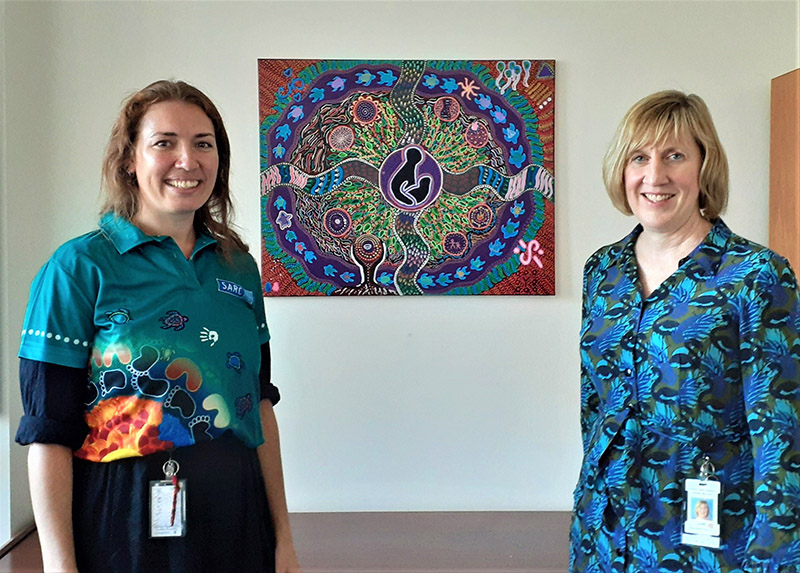Sexual Assault Awareness Month
 Danielle Thurlow, Aboriginal Community Liaison Officer at SARC with Jodi Graham, Executive Director
Danielle Thurlow, Aboriginal Community Liaison Officer at SARC with Jodi Graham, Executive Director
Sexual Assault Awareness Month (SAAM) (external site) is an International Campaign to draw attention to the impact of sexual assault. The Sexual Assault Resource Centre (SARC), part of WNHS, is supporting the 2022 campaign theme ‘Building Safe Online Spaces Together’ by creating community awareness of their service and encouraging people to join in the efforts towards sexual assault prevention. Sexual assault is ANY unwanted sexual act which is threatening, violent, forced or coercive and to which a person has not given consent or was not able to give consent.
SARC services are is partially state-wide. Services offered to people in the Perth Metropolitan area include emergency services for recent sexual assaults (within 2 weeks) and counselling services for historical sexual trauma for any gender 13 years and older. SAAM enables us to highlight the work we are doing, including improving access to services for Aboriginal People.
Danielle Thurlow has been employed as the Aboriginal Community Liaison Officer at SARC for 3 years and her primary role is to work with the Aboriginal Community to increase awareness of services and to spread the word about SARC and what we do for people who need support most.
Kylie Laughton, Danielle’s Manager, describes Danielle’s achievements as a ‘list as long as your arm’! Danielle is a Ngarluma Yinjibarndi woman from the Pilbara region, with connections to the Nyul Nyul and Nyikina people in the Kimberley region. Seen here with Jodi Graham, Chief Executive of WNHS, Danielle even created the artwork in the background! Designed as a ‘contract’ for SARC and WNHS to bridge the divide, the artwork (external site) features on a variety of NMHS items including staff shirts.
Danielle spoke about one of her achievements at SARC, providing education to teammates and beyond on how to establish rapport in a ‘culturally intelligent way’.
How do you go about educating people on cultural awareness?
Firstly, you have to have a very good grounding in understanding the underlying influences of colonisation and the stages of decolonisation. Without sound knowledge of these two references we can find ourselves stuck in ignorance where we continue to repeat destructive patterns. So the first thing that had to be done is exploration of what we do and don’t know. To bring this awareness to the surface and cement it in a way that acts as a forever lens when involved in decision-making or ways of advocating towards decision-making.
To keep people engaged and constantly learning, we have approached slow and short bursts of free flow conversation and awareness-raising, through exposure. This has been done in line of particular national celebratory dates such as:
- National Closing the Gap Day
- Sorry Day
- Reconciliation Week
- NAIDOC Week
Other spaces have included invitation to staff meetings and staff yarning circles, as part of the induction process for new staff.
It is really important that there is a role imbedded structurally to support the free flow conversations and awareness raising through exposure, and our personal healing needs to be attended to in order to remain cool, calm and collected during difficult conversations, so we don’t give into our triggers by becoming reactive but, rather, we tune into our triggers to assist the conversation for the purpose of expanding on deeper understandings.
Why is it important? Can you give an example?
To have me explain why this work is important defeats the point of what I have been doing with the staff. For me, there are many reasons this work is important but what’s most important is people need to find ‘the why it’s important’ within themselves, to know why this work is important. If I tell you why this work is important than I’ve simply projected what I feel is important, which has the patterned potential to keep you separated from the importance of the work, simply because you haven’t found your own reason for its importance.
There is one example where this pattern has played out. This example is the ‘Reconciliation in Australia’ movement. People know this work is important but what they haven’t done is found themselves connected to why it is personal important for them. Without finding your personal connection to the importance of something, it enables a person to be distant and remain on the edge of being involved. When we find our personal importance, we can never be distant as it becomes central to every part of who you are and your involvements.
How successful do you feel it has been?
Culture shift is a slow moving force. We cannot move too fast because so much is involved, to the point of sometimes hitting the deepest parts of ourselves where we need time to process and integrate. We cannot move too slow as we are in a world where we are constantly in movement, to not consistently engage in nurturing cultural shifts towards moments of revelation, we continue to deprive people from experiencing satisfaction, inspiration and motivation. So, I could say we have been successfully finding the balance and we know it has been a success because we continue finding ourselves more aligned and less separated.
How has it been implemented?
The NMHS Aboriginal Health team conducted a state-wide consultation process with the Aboriginal people of WA. From the findings , a Health and Wellbeing framework was developed with an implementation plan imbedded until 2030 . SARC recently went through a planning day to renew and align our operational strategies with the framework and part of our core focus. This strategy supports my role to drive the facilitation of the free flow conversation and awareness raising through exposure with the strong support of other staff to deliver.

